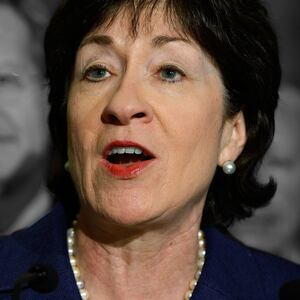Sen. Susan Collins (R-ME) has been the object of liberal ire since her 2018 vote to confirm Brett Kavanaugh to the Supreme Court. Now in a tight re-election fight, whatever hopes she might have had of putting that episode behind her were dashed this week, when now-Justice Kavanaugh cast a dissenting vote in the Supreme Court’s latest decision to uphold the legal framework that grants access to women seeking abortions.
But the legacy of Collins’ vote on Kavanaugh hasn’t been all bad for the longtime Maine senator. In fact, it’s appeared to earn her some powerful and deep-pocketed new allies.
Collins, who’s staked out a brand as a pro-choice moderate Republican over her nearly 24 years in the Senate, has historically never been a favorite in the conservative legal circles embodied by the Federalist Society, a leading group of right-of-center attorneys and legal thinkers.
ADVERTISEMENT
But that, apparently, has changed dramatically since Collins’ fateful vote. Since 2019, Collins’ campaign and two associated political action committees have raked in nearly $200,000 from donors who are also high-dollar contributors to the Federalist Society. Many of those who gave to Collins had never cut a check for her before.
The group of 39 donors includes Leonard Leo, the former executive vice president of the Federalist Society and a driving force behind President Trump and the Senate GOP’s historically successful efforts to stock the federal bench with conservative judges.
Leo and his wife, Sally—neither of whom had previously donated to Collins—each gave the maximum $5,600 to Collins’ campaign committee last year. Half of Leo’s support came by way of a joint fundraising committee supporting three other Senate Republicans. Last summer, Leo hosted a fundraiser for Collins at his newly bought Maine vacation home, an event that appeared to open up more Federalist Society funds for the senator.
Leo was one of five Federalist Society-associated first-time donors to Collins, a group that also included Daniel Casey. Casey is the president of the Judicial Crisis Network, a group with ties to the Federalist Society that led the charge for Kavanaugh’s confirmation. GOP mega-donors linked to the group also got on board with Collins after her vote. Philip Anschutz, the billionaire whose foundation supports the Federalist Society, gave $5,600, the per-cycle maximum, to Collins’ campaign.
Others were not first-time Collins donors but dramatically stepped up their giving this year. In 2019, Bernard Marcus, co-founder of Home Depot, and his wife Billi Wilma gave a total of $20,800 to Collins’ campaign and to her leadership PAC. The couple’s foundation is part of the Federalist Society’s Madison Club, the honorific bestowed on its major donors. Marcus is in the Club’s Platinum Level, reserved for those who give $100,000 or more. Previously, the couple had donated a total of $3,000 to Collins across her 2014 and 2008 re-election campaigns.
Support for Collins from C. Boyden Gray, a former counsel to President George H.W. Bush and a Federalist Society board member, also illustrates the evolving relationship between the senator and the conservative legal group. In 2003, Gray’s conservative advocacy group ran controversial ads in Maine pressuring the senator to vote in favor of a conservative Bush nominee, William Pryor, Jr., to the bench. Ultimately, Collins was one of just two Republican senators to vote against Pryor. After giving $3,600 to her 2014 effort, Gray has given nearly $8,000 to Collins’ political outfit since her Kavanaugh vote.
Most of the donations from Federalist Society backers went directly to Collins’ campaign. Some also supported Collins’ leadership PAC, which she can use to dole out funds to allies and help build political capital. Others financed the Collins Victory Committee, a joint fundraising account supporting both her campaign and her leadership PAC.
The groundswell in financial support that Collins is receiving from conservative legal bigwigs comes at a time when the nation’s courts have become increasingly politicized. Kavanaugh’s nomination became a rallying point for many Democrats and Democratic-allied groups. And Collins’ support for it—which culminated in a nationally watched Senate floor speech—put a target squarely on her back.
While those invested in the confirmation rushed to offer their appreciation, progressives began fundraising for her challenger immediately, raising more than four million dollars before Maine House Speaker Sara Gideon even became the Democratic frontrunner. The end result has been one of the more expensive and tightly fought Senate races of the cycle, with Collins facing a serious challenge for a seat she has held comfortably since 1996.
The senator’s campaign has raised over $10.3 million since January 2019; Gideon, meanwhile, has raised over $14.8 million in the same time period. Collins has $1 million more in the bank, however.
“Senator Collins has always received strong support from across the ideological spectrum,” Kevin Kelley, a spokesman for Collins’ campaign, told The Daily Beast.
“Bribery doesn’t work on Senator Collins,” Kelley added, in reference to the money raised by liberal groups around her Kavanaugh vote. “She made up her mind based on the merits of the nomination. It’s laughable that the same people who tried to buy Senator Collins’ vote for more than $4 million now appear to be suggesting that she sold her vote for far less.”
The Federalist Society did not respond to a request for comment. But a source close to the Kavanaugh confirmation process described the donations as an organic show of support for a senator crucial to getting popular conservative judges confirmed. The source said there was no organized effort to back Collins financially after her confirmation vote, but that people active in the conservative legal community independently deemed her worthy of support.
"Countless Americans were inspired by Senator Collins’ principled speech in support of Justice Kavanaugh,” the source said, “so it should not be surprising to anyone that she raised more money after that, especially in light of the disgusting threats that were being made toward her and her staff at the time.”
As for the donations that liberals made to a prospective campaign account for Collins’ eventual opponent, those too have been criticized as an attempt to financially incentivize the Senator’s vote; and not just by Collins’ aides. A conservative election attorney, Cleta Mitchell, told Newsmax at the time that the liberal groups may have run afoul of federal law by “trying to tie her official action to their threat that they’re going to give $1 million to somebody to run against her, if she doesn’t vote the way [they want her] to.” Ady Barkan, the progressive activist who launched the campaign, insisted it was legal and had the blessing of the Federal Elections Commission.
Mitchell, a financial supporter of the Federalist Society, later gave $1,000 to Collins’ campaign, her first donation, after her vote to confirm Kavanaugh.








